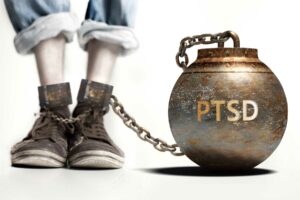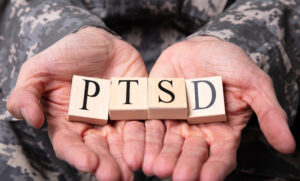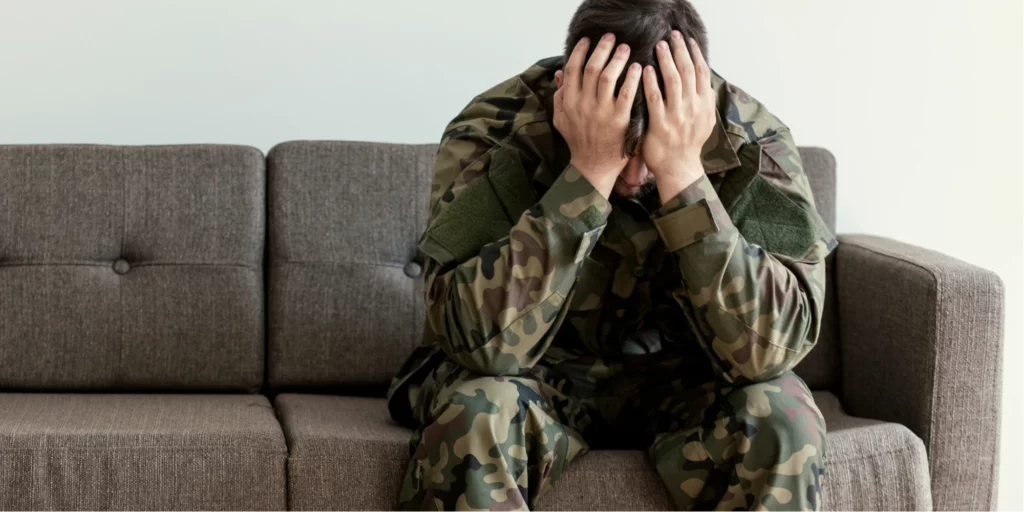Military PTSD can manifest in different ways, depending on the severity. This may include nightmares and flashbacks, depression, anxiety, anger, and a host of other symptoms. The article provides a list of warning signs that you might be experiencing this condition. It also discusses the need to seek out professional help.
Contents
- 1 What Is Post-Traumatic Stress Disorder (PTSD)?
- 2 What Is Military PTSD?
- 3 Warning Signs Of Military PTSD
- 4 Causes Of Military PTSD
- 5 How You Can Help A Loved One With Military PTSD?
- 5.1 Help your loved one get treatment
- 5.2 Help your loved one cope with symptoms
- 5.3 Help provide structure around the house
- 5.4 Help with financial needs
- 5.5 Offer to drive your loved one places
- 5.6 Educate yourself about military PTSD
- 5.7 Be patient
- 5.8 Make time for each other
- 5.9 Reach out to Mental Health Resources
- 6 PTSD In Military Veteran Risk Factors
- 7 Self Care For Military PTSD
- 8 Therapy For Military PTSD
- 9 Ways To Cope With Stress Of Living With Someone Who Has Military PTSD
- 10 Conclusion
What Is Post-Traumatic Stress Disorder (PTSD)?

PTSD is a serious mental health condition that can develop after exposure to a traumatic event, such as being in an accident or witnessing a violent crime. People with PTSD often have intense, frightening thoughts and memories of their ordeal and feel emotionally numb, especially with people they were once close to. They may also experience sleep problems, depression, anxiety, and a tendency toward reckless behaviors.
What Is Military PTSD?
Military PTSD is a condition that can occur after someone has been exposed to a traumatic event or events while serving in the military. These events can be very stressful and can cause a person to develop this condition. Military PTSD can manifest in different ways, depending on the severity. This may include nightmares and flashbacks, depression, anxiety, anger, and a host of other symptoms. The article provides a list of warning signs that you might be experiencing this condition. It also discusses the need to seek out professional help.
Military PTSD is a lot more common than some people realize and can have a significant impact on someone’s life if they are not able to get the help they need. For these reasons, it’s important for loved ones of veterans with this condition to be aware of what their friends or family might be going through and do everything that they can in order to support them as best as possible.
Warning Signs Of Military PTSD
The article provides warning signs that you might be experiencing military PTSD including-

- Nightmares
- Flashbacks
- Irritability or angry outbursts
- Depression
- Hyper-vigilance (is on high alert for threats)
- Suicidal thoughts
It is important to remember that these symptoms do not necessarily mean that you are experiencing military PTSD. These symptoms may also be indicative of other illnesses. However, it is important to look for warning signs that an individual might be experiencing PTSD in order to get help quickly enough to address the situation before it worsens or becomes too difficult to handle on your own.
Causes Of Military PTSD
There can be many different causes of military PTSD. One of the most common causes is exposure to a traumatic event or event. This may include witnessing or being involved in a traumatic event such as a car accident, assault, natural disaster, or combat. Other causes of military PTSD can include
- Having a mental health condition before enlisting
- Living in a combat zone
- Being sexually assaulted or raped
- Having a friend or family member who was killed or wounded
- Returning home and not being able to adjust back to civilian life
- Having difficulty with transitions
How You Can Help A Loved One With Military PTSD?

Family and friends can play an important role in helping to support a loved one who is experiencing military PTSD. The article discusses 5 ways that family and friends can provide support to a loved one who is experiencing military PTSD including
Help your loved one get treatment
You should always encourage a loved one to seek out help when experiencing symptoms of PTSD and with anything else in their life which may be challenging. For example, if your loved one is having trouble adjusting to life back at home after returning from service, encourage them to seek out help.
Help your loved one cope with symptoms
You can help your loved ones deal with their symptoms by listening to them and allowing them to share their feelings without judgment or interruption. You should also be willing to lend an ear during tough times when your loved one might need someone who will listen to his or her troubles.
Help provide structure around the house
If you live with a person who has military PTSD, you may want to provide more structure around the house for example allow them a set time each day where they can have alone time in order for him or her the need to rest and recover from the day. You can also offer to run errands for your loved ones or prepare a meal when you know that they will be having a tough day.
Help with financial needs
Your loved one with military PTSD may need help paying bills and other expenses in order to make ends meet. This is especially true if their symptoms are leading them to experience difficulty holding down a job or attending school/university. If your budget permits, consider offering to support your loved one financially for short periods of time until he or she can get back on their feet again. Keep in mind, however, that the best way to help financially is usually by encouraging them to seek out professional treatment for his or her symptoms first- this allows him or her the opportunity to seek help and support in getting back on their feet as soon as possible.
Offer to drive your loved one places
If your loved one with military PTSD is experiencing problems driving, you can offer to take them where they need to go for appointments or errands. You can also ask if it would be okay for you to accompany them during tough times. This may make the situation less stressful for both of you.
Educate yourself about military PTSD
It is important that you learn more about what your loved one might be going through in order to support them the best way possible.
Be patient
PTSD can cause a person to experience mood swings or seem distant at times. These changes might make it difficult for you to communicate with your loved one, but they will pass over time. It is important not to take these things personally and remain patient with your loved ones during this time; they really do need your support.
Make time for each other
Make time for each other and focus on relieving stress outside of the home. It’s important to take time for each other and focus on having fun together. This will help reduce the stress in your loved one’s life while they are dealing with military PTSD symptoms.
Reach out to Mental Health Resources
These resources provide a wealth of information, guidance, and support to veterans who might be struggling with military PTSD symptoms. The National Center for Posttraumatic Stress Disorder is also really helpful in providing information about current research studies focused on helping veterans recover from this condition. Loved ones should reach out if they think someone they love might be experiencing military PTSD and take advantage of the many helpful resources that are available.
- Find support for yourself
- Make sure that you take care of your own physical and
- Talk about the traumatic event(s) that caused them to develop this condition if they are willing
- Avoid trying to take their feelings or experiences away from them
- Be patient with them as you help them work through these difficult times
- Don’t hold their condition against them; it’s not something they chose or wanted
There are many resources available for those affected by military PTSD, including hotlines, support groups, advocacy organizations, and other resources designed to help individuals access information about what services might be available to them.
PTSD In Military Veteran Risk Factors
There are many risk factors that can increase a military veteran’s chances of developing PTSD. Some of these include:

- Having a history of mental health problems before joining the military
- Exposure to combat or other traumatic events during military service
- Having experienced physical or sexual abuse during childhood
- Living with chronic pain
- Smoking or drinking alcohol regularly
- Having problems sleeping
- Experiencing relationship problems
- Having a family member or friend with PTSD
There are also things that make it more likely for a military veteran to receive treatment for PTSD.
Self Care For Military PTSD
Military PTSD can often be debilitating and leave veterans feeling isolated. It is important for veterans to understand that they are not alone and there are steps they can take to manage their PTSD. Self-care is an important part of managing PTSD and can include things such as exercise, relaxation techniques, and healthy eating. It is also important for veterans to stay connected to their support system, whether it be family or friends or a support group for military veterans. Finally, it is important for veterans to seek professional help if they are struggling to manage their PTSD.
Exercise
Exercise releases endorphins that help reduce stress and depression. It also helps manage insomnia, headaches, and chronic pain which many veterans struggle to sleep through. Exercise can be anything from running, cycling, or lifting weights to doing household chores such as raking leaves or washing the car.
Relaxation
Relaxation techniques such as meditation and yoga can help increase mindfulness and lower blood pressure. Veterans struggling with PTSD should practice deep breathing exercises daily and make time in their schedule for a relaxing activity like knitting or painting. It can also be helpful to take up a hobby that requires focus such as gardening or fly fishing to direct thoughts away from traumatic memories.
Social Support
Social support provides tremendous benefits for veterans living with PTSD such as reduced anxiety and improved quality of life. It is important for veterans to find an outlet where they can leave the isolation of their homes and be around other people. This could be spending time with family, friends, or going to a support group for veterans with PTSD.
Healthy Eating

Diet plays a major role in how a person feels on a daily basis. What someone eats will often determine how tired or energetic they feel throughout the day. Most importantly, healthy eating helps reduce feelings of depression and anxiousness that many vets experience due to low levels of serotonin in the brain from consuming too much sugar and saturated fats found in junk food. If veterans struggle to cook healthy meals at home they may want to consider finding a local grocery store that offers prepared meals or join a meal program that delivers healthy meals to their doorstep.
Professional Help- Many veterans struggle with PTSD and often do not understand how it has impacted their lives. While self-care can play an important role in managing symptoms, it may be difficult for some people to improve without the help of a professional. There are several options when seeking treatment such as individual therapy, group therapies such as cognitive processing therapy (CPT), and pharmacological treatments like mood stabilizers and SSRIs.
It can be tough for a military veteran suffering from PTSD to deal with this condition alone. Luckily, there are many resources available to help them get the support they need. If you know someone struggling with PTSD, encourage them to research their options so they can find the best way to get help. You might even help them do this by looking together at different resources and treatment options. The earlier your loved one starts receiving treatment for his or her symptoms of military PTSD, the better chance they have at recovering.
Therapy For Military PTSD
There are many different types of therapy that can be helpful for those suffering from military PTSD. Some of the most common therapies include:
- Cognitive Behavioral Therapy (CBT)
- Trauma-Focused CBT
- Eye Movement Desensitization and Reprocessing (EMDR)
- Prolonged Exposure Therapy (PET)
- Group Therapy
- Family Therapy
Therapy is often very beneficial for those struggling with military PTSD because it provides a safe place for them to discuss their experiences and symptoms with a therapist who understands what they are going through. Therapists can provide guidance, support, and tools to help military veterans manage their PTSD symptoms.
Ways To Cope With Stress Of Living With Someone Who Has Military PTSD

There are many ways you can cope with the stress of living with military PTSD. These are some of the examples-
1) Give your loved one space
To help yourself stay calm during these difficult times, it’s important that you take care of yourself by meditating, exercising, and practicing self-care every day; this will give you the emotional strength that you need to support your loved one through their journey towards recovery. You might feel like giving your loved one unlimited space is the best way to deal with the stress of military PTSD, but if you notice them withdrawing from you, it’s important to let them know that you are available if they need a listening ear.
2) Talk about the traumatic event(s)
It can be tough for a military veteran who is living with PTSD symptoms to talk about their experiences during war or other traumatizing events. If you notice that your loved one has been reliving these memories in their mind and struggling with nightmares, flashbacks, or other symptoms of military PTSD, encourage them to reach out for help from a mental health professional. This might seem scary at first, but confronting these difficult memories head-on and being aware of how they came across during critical points in combat will help your loved one process his or her thoughts and experiences.
3) Validate the traumatic event(s)
Your military veteran might not be ready to talk about their time in service just yet, but that doesn’t mean that you can’t listen to them when they’re finally ready. By showing interest in what they’ve been through and validating the fact that it was difficult, you’ll open up an entirely new level of communication between you and your loved one and strengthen the bond you already share.
4) Be encouraging
Don’t be critical about therapy or medication. Seeing a therapist for military PTSD is important, so do everything in your power to encourage this. If your partner isn’t sure whether or not they should talk to their therapist, you can offer your support and let them know that it’s perfectly acceptable to feel the way they do.
5)Encourage them to talk
Encourage them to talk about what happened; don’t force them into uncomfortable situations. One of the most important priorities for you should be making sure that your loved one is comfortable with where they are. If they’re not having an open or safe conversation with you, this could lead to feelings of depression, isolation, and extreme anxiety. Don’t push your veteran into a situation in which he or she isn’t ready to cope with PTSD without taking the necessary steps towards recovery first.
Conclusion
Military PTSD can be a difficult condition to live with, both for the veteran and their loved ones. However, there are many ways that you can support your partner or family member who is struggling with this disorder. Some of the most important things you can do include giving them space when they need it, talking about the traumatic event(s), validating their experiences, and being encouraging. Remember that each person’s journey towards recovery is different, so don’t push your loved ones into uncomfortable situations before they’re ready. Take care of yourself by practicing self-care and staying informed on how you can best support your military veteran through their struggle with PTSD symptoms.
For more information, please contact MantraCare. PTSD or Post-Traumatic Stress Disorder is a mental health condition that affects people who have experienced or witnessed a traumatic event. If you have any queries regarding Online PTSD Counseling experienced therapists at MantraCare can help: Book a trial PTSD therapy session


